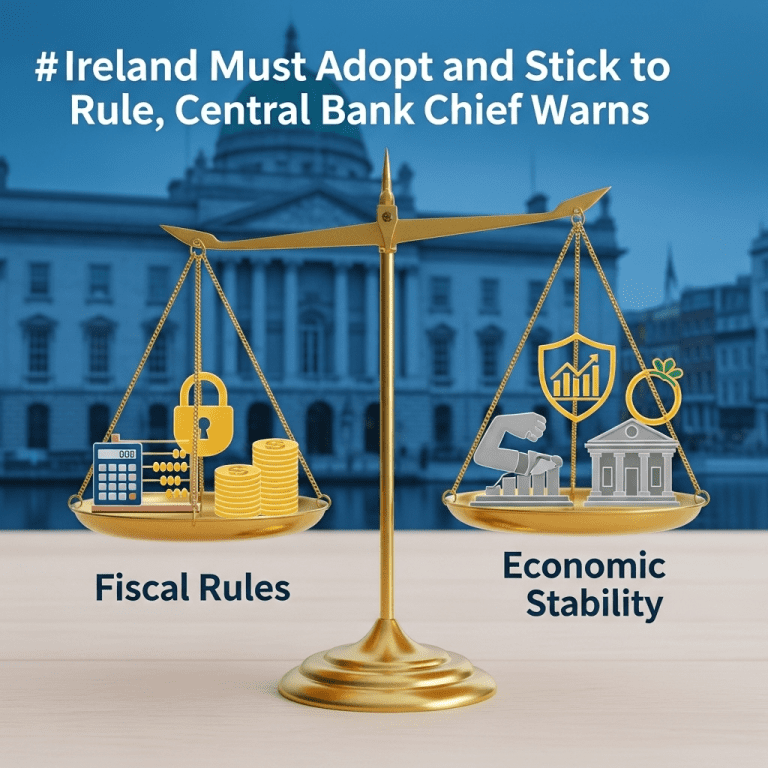The message is clearer than ever: Ireland must adopt and stick to fiscal rule, central bank chief warns. As Ireland’s economy transitions into a delicate post-pandemic era and faces global uncertainties, the adoption and strict adherence to sound fiscal policies are pivotal. Recent remarks from the Central Bank of Ireland’s chief underscore the strategic importance of fiscal rules and the potential consequences of improvisation or complacency.
Understanding Why ‘Ireland Must Adopt and Stick to Fiscal Rule, Central Bank Chief Warns’
At a critical juncture for the nation’s finances, the warning – “Ireland must adopt and stick to fiscal rule, central bank chief warns” – echoes through financial news. The central bank emphasizes that structured fiscal rules are vital to ensure long-term economic resilience, especially in light of fluctuating corporate tax revenues and uncertain international markets.
What Are Fiscal Rules?
Fiscal rules are predefined guidelines set by governments to direct spending and borrowing, keeping national budgets disciplined and sustainable. For Ireland, these measures could limit how much the government can spend annually or how much debt it can accrue relative to economic output. These rules are designed to prevent both excessive spending during prosperous times and drastic cuts during downturns.
Economic Risks of Ignoring Fiscal Discipline
Failing to abide by fiscal rules jeopardizes Ireland’s credibility in global financial markets. The central bank chief has repeatedly stressed that without adherence, investor confidence could wane, borrowing costs might rise, and future economic shocks could be harder to absorb. Maintaining strict fiscal discipline not only helps keep government bond yields stable but reassures international investors of the country’s solvency.
Corporate Tax Volatility: A Looming Concern
One particular worry for Irish policymakers is the volatility of corporate tax receipts, largely stemming from multinational activity. While these tax inflows have bolstered public finances in recent years, the central bank warns that over-reliance on unpredictable revenues increases fiscal vulnerability. Should these receipts decline abruptly, government spending promises might become unsustainable without a robust fiscal rule in place.
The Path Forward: Commit to Fiscal Governance
To future-proof its economy, the central bank urges policymakers to formalize and strictly observe clear fiscal rules. Such rules would require the government to save excess tax revenues during boom periods instead of expanding spending, thus creating buffers for economic downturns. This policy shift is seen as an essential safeguard for protecting Ireland’s prosperity and social programs in turbulent times.
International Comparisons and Lessons
Countries that have implemented and respected fiscal rules, such as Sweden and the Netherlands, offer valuable lessons. These nations have enjoyed stable growth, reduced debt burdens, and enhanced resilience during global economic shocks. The central bank suggests Ireland should draw inspiration from these examples and tailor rules befitting its unique economic structure.
Political Challenges to Implementation
While the economic case is convincing, the political reality is more complex. Upcoming elections and social spending pressures make fiscal restraint difficult to champion. Yet, as the central bank chief reiterates, the willingness to set aside short-term popularity for the sake of long-term economic health is crucial. Failure to implement these reforms might leave Ireland exposed to adverse shocks and pro-cyclical budget policies.
What Could Fiscal Rules Mean for Irish Citizens?
For citizens, adopting strict fiscal governance means greater economic stability, fewer sudden cuts to public services, and lower risks of austerity. It also supports sustained investment in infrastructure, education, and healthcare. However, there may be trade-offs in terms of restrained government spending during boom years, a necessary compromise to ensure fiscal health over the coming decades.
Expert and International Support for Fiscal Rules
Global financial organizations, including the IMF and the European Commission, have consistently advocated for member states like Ireland to embed fiscal discipline in their policy frameworks. Their research indicates that credible rules heighten economic stability and shield nations from external financial shocks. As Ireland seeks to remain competitive, following this guidance will be pivotal.
The Role of Public Awareness and Accountability
As the central bank chief points out, public understanding of the need for fiscal rules is essential. Building public support can help policymakers withstand pressure to sidestep necessary fiscal measures for short-term gains. Furthermore, transparent monitoring and regular reporting on rule adherence will strengthen accountability and trust in public institutions. For more insights on sustainable public finance, review the latest research at this trusted resource for economic analysis.
Looking Ahead: Ireland’s Fiscal Future
In sum, the call for Ireland to adopt and stick to fiscal rule, central bank chief warns, must now translate into concrete policy action. Fiscal discipline, underpinned by well-designed rules, is critical for safeguarding Ireland’s economic future amid rising global uncertainty. As pressure mounts to act decisively, ongoing debate and robust analysis will determine whether Ireland embarks on a path toward long-term financial resilience or exposes itself to renewed fiscal challenges. For the latest updates on fiscal policies and macroeconomic trends, visit the official economic news platform.









